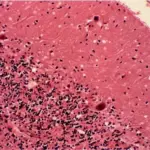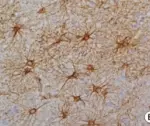Gerstman-Straussler-Scheinker syndrome is an extremely rare, usually familial inherited fatal neurodegenerative disease.
What is the Pathology of Gerstman-Straussler-Scheinker Syndrome?
Etiology: The cause of Gerstman-Straussler-Scheinker Syndrome are the prions, which are a class of pathogenic proteins that are resistant to proteases. These prions then form clusters in the brain, which are responsible for the neurodegenerative effects seen in patients.
Genes involved: Point mutations in the PRNP gene.
Pathogenesis: The prion proteins (PrP) are produced by the prion protein gene (PRNP gene) do not get degraded, and cause more misfolded proteins that gives rise to the disease.
How does Gerstman-Straussler-Scheinker Syndrome Present?
Patients with Gerstman-Straussler-Scheinker Syndrome have an average age range of 35-50 years. Males and females are equally affected. The symptoms, features, and clinical findings associated with Gerstman-Straussler-Scheinker Syndrome include dementia, dysarthria, nystagmus, truncal ataxia, and parathesia.
How is Gerstman-Straussler-Scheinker Syndrome Diagnosed?
Gerstman-Straussler-Scheinker syndrome is diagnosed by genetic testing.
How is Gerstman-Straussler-Scheinker Syndrome Treated?
Gerstman-Straussler-Scheinker syndrome has no cure.
What is the Prognosis of Gerstman-Straussler-Scheinker Syndrome?
The prognosis of Gerstman-Straussler-Scheinker Syndrome is poor.



